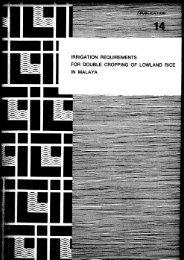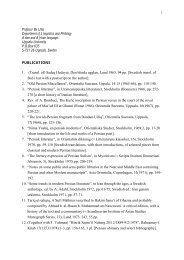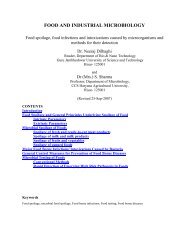On the Future of Indigenous Traditions - Munin
On the Future of Indigenous Traditions - Munin
On the Future of Indigenous Traditions - Munin
Create successful ePaper yourself
Turn your PDF publications into a flip-book with our unique Google optimized e-Paper software.
hindrances for <strong>the</strong> Adivasis in this regard in Jharkhand today? Would <strong>the</strong>re be<br />
answers to <strong>the</strong>se questions?<br />
To find answers to <strong>the</strong>se questions we have to look at <strong>the</strong> complex issue <strong>of</strong> Jharkhand<br />
from within its historical as well as socio-political background. Can <strong>the</strong> Adivasis<br />
claim <strong>of</strong> <strong>the</strong>ir customary system/laws and its revival as one <strong>of</strong> its answers? In <strong>the</strong><br />
following chapter I have touched up its historical development from a socio-political<br />
point <strong>of</strong> view to find out how <strong>the</strong>y have created a problem in <strong>the</strong> recent years in which<br />
<strong>the</strong> Adivasis have become victims <strong>of</strong> <strong>the</strong> developmental processes. While in <strong>the</strong> past<br />
<strong>the</strong>ir customary system was <strong>the</strong>ir social and political strength, <strong>the</strong>y now face a big<br />
challenge, to have <strong>the</strong>ir self-governance restored even in spite <strong>of</strong> having national law<br />
(PESA) in <strong>the</strong>ir favour.<br />
2.7 Jharkhand: prolonged non-formation <strong>of</strong> states<br />
becomes a reason for fur<strong>the</strong>r exploitation and neglect<br />
Why was <strong>the</strong> formation <strong>of</strong> Jharkhand state delayed for all <strong>the</strong>se years? 72 years, if<br />
looking at it before independence and 53 years after it. How <strong>the</strong> development <strong>of</strong> <strong>the</strong><br />
modern state was used against <strong>the</strong> basic interest and identity <strong>of</strong> <strong>the</strong> Adivasis is a<br />
serious question. It is especially, to see those policies made in <strong>the</strong> ‘national interest’<br />
and ‘national development’ and <strong>the</strong> impact it had on <strong>the</strong> Adivasis and <strong>the</strong>ir social<br />
organizations.<br />
The administration <strong>of</strong> <strong>the</strong> Jharkhand region, metaphorically speaking, was given in<br />
‘forced marriage’ to Bihar state, during <strong>the</strong> British time, which continued even after<br />
<strong>the</strong> country’s independence by not given <strong>the</strong> status <strong>of</strong> independent statehood during<br />
demarcation <strong>of</strong> state boundaries. Then it was <strong>the</strong> dewani or lagan – tax to <strong>the</strong> British,<br />
and now it was <strong>the</strong> revenue it generated for <strong>the</strong> state. Initially <strong>the</strong> argument for not<br />
making it a separate state was that <strong>the</strong>re was no single language spoken in that region,<br />
which was one <strong>of</strong> <strong>the</strong> preconditions in demarcating <strong>the</strong> state administrative<br />
boundaries.<br />
46

















